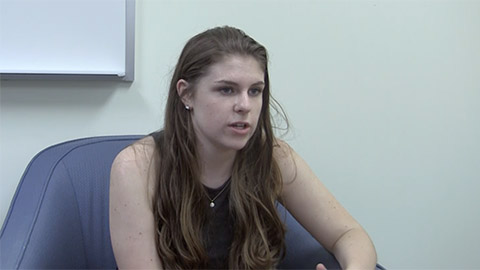by Emily Temple, The Whetstone
Courtney Gross, president of Psychology Club and vice president of Psi Chi, a Psychology Honor Society, was happy to see the Student Government Association start the Wesley Express shuttle program for students.
“I wish we had that when I was a freshman without a car, instead of having to rely on friends to go to the store,” Gross said.
“The shuttles have really helped out many students.â€
On a smaller scale, the SGA also helps individual organizations.
“They helped me start my own organization,†said Kelsey Fitzpatrick, current president of Get Involved Value Everyone (GIVE) and next year’s SGA secretary.

Kelsey Fitzpatrick, SGA Secretary 2016-17
“If I had any questions I could go to them, and I knew they would answer them for me.â€
Next year’s SGA president, Destiny Hollis, says programs like this are what the SGA is all about.
“We are in SGA for the sole purpose of making sure the student body’s voice is heard across the board,†Hollis said.
She says some other programs she’s proud of are the swipe system being implemented next year in Parker Library, the fight against Wesley’s Chief Financial Officer to maintain student activity fees, the new treadmill for the Malmberg Gym, and the underground keypad system.
In spite of these accomplishments, sometimes the student body’s voice is hard to hear, even on the SGA executive board.
Gross says she doesn’t see very good communication between students and the SGA.
“All of the announcements from SGA are through email, but they don’t encourage two-way communication,†Gross said.
“Instead, the SGA basically tells us what we are mandated to do as an organization to remain active on campus, and we do as they say without communicating more than listening to their announcement.â€
Hollis says students need to talk about problems at SGA congress meetings, where they can be solved.
“Students voice their concerns to their friends, but not to us,†Hollis said.
“Next year, I hope students have a better understanding of who they can talk to, such as the SGA board, to get their voice heard.â€
Although there have been accomplishments, some SGA endeavors have failed to launch.
Most recently, WC DubFest, initially planned as a new college tradition, was canceled days before it began for reasons such as low student interest and involvement, says Dr. Cynthia Newton, SGA advisor.
“Despite initial excitement/interest among organizations, only five student organizations actually planned anything for the event despite being assured funding to cover the expenses,†Newton said.
Newton says the organizations planning to participate were DPE, NAMI on Campus, APO, the Multicultural Student Union, and Sustainable Wesley.
Other organizations, such as Psychology Club, planned activities that were later carried out independently, for their own members.
-Courtney Gross, Psychology Club President
Another idea from the SGA that failed to catch on was OrgSync, described as “a Facebook for Wesley College’s student organizations.” A three-year contract with OrgSync, signed by SGA as an alternative to previous site CollegiateLink, cost $20,000.
“[OrgSync] was such a hassle to use, especially since no one else seemed to be on the site using it,” Gross said.
“We were told it was mandatory, so we tried it as well as we could but with little success. It was more work than it needed to be.”
In her campaign for president last spring, Savannah Durham wanted to push OrgSync into popular use at Wesley.
Fitzpatrick, a freshman, was unfamiliar with the program.
“I believe there was a lack of understanding and miscommunications across the board, and that’s why it was not implemented,” Hollis said.
Hollis says students need to understand the limitations of SGA executive board members as they carry out their tasks.
“SGA is a volunteer-based position where we are also students, with jobs and other personal issues,†Hollis said.
“There’s been a lot of talk of what SGA does not do or what are meetings are not about but I ask that you see for yourself instead of believing everyone else.â€
While Hollis says students are moderately active in SGA meetings, there are times when interest rises.
“When a meeting’s about’s something they are passionate about, students are excited and super passionate,†Hollis said.
Paige Goodskey, SGA liaison to the food service at Wesley, says she’s often the one students are excited to talk to.
-Destiny Hollis, SGA President 2016-17
“Whenever it’s time for the liaison for people to voice opinions, they like to complain about the cafeteria and WiFi,†Goodskey said.
After announcing that Wesley is hiring a new chef for next year, Goodskey told the SGA congress that Michael Dacko, Wesley’s assistant food service director, wanted student input on next year’s menu.
She was met with immediate, eager responses both during the meeting and afterwards.
“I got about 10 emails with some great suggestions, like more berries with the fruit, mac and cheese Mondays, and not having chicken nuggets every Friday,†Goodskey said.
This communication lives up to Hollis’ expectations for the SGA.
“SGA benefits from student involvement by learning the real issues and concerns that are on campus, helping the student voice be heard and helping Wesley College as a whole.â€


